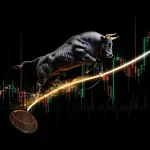A Crisis of Beliefs: Investor Psychology and Financial Fragility
Dec 21, 2024
Introduction
Financial markets, a complex interplay of economics and human behaviour, are heavily influenced by investors’ collective beliefs and decisions. Understanding the psychology of market participants is crucial for comprehending market dynamics and preventing financial fragility. As the renowned French philosopher Michel de Montaigne once said, “The greatest thing in the world is to know how to belong to oneself.” This quote underscores the importance of self-awareness and independent thinking in navigating the complexities of financial markets.
The intersection of investor psychology and financial fragility is a critical area of study, as it helps anticipate and manage potential crises, enhances decision-making, and contributes to developing more resilient financial systems. By exploring this intersection, we can identify behaviours that may lead to market instability and develop strategies to mitigate risks.
Investor psychology encompasses the cognitive and emotional factors that shape investment decisions, such as risk perception, information processing, and behavioural biases. On the other hand, financial fragility refers to markets’ vulnerability to adverse events or shocks, often resulting from excessive risk-taking, herding behaviour, or market imbalances.
The Dutch philosopher Desiderius Erasmus once remarked, “In the land of the blind, the one-eyed man is king.” This adage highlights the value of knowledge and insight in a world often driven by ignorance and irrationality. By understanding the psychological forces in financial markets, investors can gain a valuable edge and make more informed decisions.
Moreover, studying investor psychology and financial fragility is not merely an academic pursuit; it has far-reaching practical implications. The global economic crisis of 2008 serves as a stark reminder of the devastating consequences that can arise when market participants fail to recognize and manage the risks associated with their collective beliefs and actions.
Behavioural Economics: Foundations and Principles
Behavioural economics combines insights from psychology with economic theory, acknowledging that individuals do not always make rational decisions. It considers how cognitive biases, social influences, and emotional factors shape financial behaviour. This field provides a foundation for understanding investor psychology and its impact on market dynamics.
The Role of Beliefs in Financial Decision-Making
Beliefs are fundamental to financial decision-making. They encompass expectations about future events, perceptions of risk and return, and interpretations of market information. These beliefs influence investment strategies, risk management approaches, and interactions with other market participants. Understanding how beliefs are formed, updated, and potentially distorted is essential for predicting investor behaviour and market outcomes.
Overview of Financial Fragility: Causes and Consequences
Financial fragility refers to financial systems’ susceptibility to destabilizing events or shocks. It arises from excessive risk-taking, market imbalances, and interconnectedness among market participants. Fragility can lead to rapid and amplified transmission of shocks, potentially resulting in financial crises, market crashes, or economic downturns.
Historical Context and Case Studies
The Dot-com Bubble
The late 1990s saw a rapid rise in technology stocks fueled by optimistic beliefs about the internet’s potential. However, many of these companies lacked solid business models, and their valuations were unsustainable. When investors realized this, a wave of selling ensued, causing the dot-com bubble to burst, resulting in significant losses and a period of market correction.
The 2008 Financial Crisis
The global financial crisis of 2008 was triggered by a combination of factors, including lax lending standards, excessive risk-taking by financial institutions, and the proliferation of complex financial derivatives. The crisis exposed the fragility of the economic system and the role of herd behaviour, as panic selling and a loss of confidence led to a severe market downturn.
Recent Market Volatility: COVID-19 Pandemic
The COVID-19 pandemic caused significant economic disruptions and heightened market volatility. Initial sharp declines in worldwide stock markets were followed by a rapid recovery, partly due to unprecedented monetary and fiscal stimulus measures. This episode highlighted the impact of external shocks on investor sentiment and the influence of policy interventions on market stability.
Analysis of Investor Behavior During Crises
During financial crises, investor behaviour is influenced by cognitive and emotional factors. Cognitive biases, such as loss aversion and the disposition effect, can lead to irrational decision-making. Additionally, fear, panic, and herd behaviour may contribute to excessive risk aversion or speculative behaviour, further amplifying market volatility.
Impact of Collective Beliefs on Market Stability
Collective beliefs and sentiments can significantly impact market stability. When investors share similar expectations and assumptions, their coordinated actions can reinforce market trends. However, when these beliefs are disrupted or contradicted, it can lead to rapid shifts in sentiment, triggering market corrections or crises. Thus, understanding and monitoring collective investor psychology is essential for assessing financial fragility.
Psychological Mechanisms Influencing Investor Behavior
Confirmation Bias
Investors tend to seek and interpret information in a way that confirms their existing beliefs. This bias can lead to ignoring contradictory evidence and maintaining investment positions even in changing market conditions.
Overconfidence
Overconfidence can cause investors to overestimate their abilities, leading to excessive trading, inadequate diversification, and a tendency to take undue risk. This bias may contribute to financial fragility as investors underestimate potential losses.
Herd Behavior
Herd behaviour refers to investors’ tendency to follow others’ actions, often driven by a fear of missing out or a perceived safety in numbers. When investors rush to buy or sell simultaneously, this behaviour amplifies market trends and contributes to bubbles and crashes.
Fear and Panic
Fear and panic can trigger risk-averse behaviour, causing investors to sell assets hastily and potentially exacerbating market downturns. During crises, these emotions can lead to self-reinforcing cycles of selling pressure and declining prices.
Greed and Exuberance
Greed and exuberance can drive speculative behaviour, leading investors to take on excessive risks and overvalue assets. This emotional state can contribute to market bubbles and subsequent crashes when optimism turns to disappointment.
The Concept of Market Sentiment
The market sentiment reflects investors’ prevailing emotional tone and attitudes toward the market. It influences investment decisions and can act as a contrarian indicator, signalling potential market turning points. Positive sentiment can lead to overvaluation, while negative sentiment can create undervalued opportunities.
The Dynamics of Financial Fragility
Feedback Loops Between Market Conditions and Investor Beliefs
Financial fragility involves feedback loops where market conditions influence investor beliefs, shaping market behaviour. Adverse events or shocks can trigger investor sentiment shifts, leading to risk perception and investment strategy changes. These altered behaviours can amplify the initial shock, creating a downward spiral of declining asset prices and deteriorating financial conditions.
The Role of Information and Misinformation
Information is critical in financial markets, influencing investor beliefs and decisions. However, misinformation, misinterpretation, or asymmetric information can lead to mispricing and market distortions. The spread of false or misleading information can contribute to financial fragility, particularly in today’s rapid information flow through social media and online platforms.
Systemic Risks and the Contagion Effect
Financial fragility is often associated with systemic risks, where problems in one part of the economic system spread to other sectors or the broader economy. The contagion effect refers to transmitting shocks or disturbances through interconnected markets, institutions, or investors. This dynamic can rapidly escalate localised problems into systemic crises.
Leveraging Mass Psychology and Technical Analysis
Understanding and leveraging mass psychology can be a powerful tool for investors to navigate financial markets successfully. As Charlie Munger, the renowned investor and partner of Warren Buffett, once said, “The stock market is a device for transferring money from the impatient to the patient.” This quote highlights the importance of understanding crowd behaviour and maintaining a disciplined approach to investing.
Mass psychology suggests that investors can benefit from contrarian thinking, buying when the masses are panic-selling and selling when they are euphoric. Machiavelli, the Italian philosopher, also emphasized the importance of understanding human nature in his work “The Prince,” stating that “men are so simple and so much inclined to obey immediate needs that a deceiver will never lack victims for his deceptions.” This insight underscores the potential for investors to capitalize on the irrational behaviour of the crowd.
Technical analysis can enhance the effectiveness of this approach by providing a framework for identifying trends, support and resistance levels, and potential entry and exit points. By combining insights from mass psychology with technical analysis, investors can make more informed decisions and potentially increase their chances of success in the markets.
For example, during the COVID-19 pandemic, many investors succumbed to fear and panic-sold their holdings as markets plummeted. However, those who understood mass psychology and identified the oversold conditions through technical analysis could capitalize on the opportunity, buying undervalued assets and benefiting from the subsequent market recovery.
Legendary investors like Sir John Templeton exemplified this approach. He famously bought stocks during the Great Depression when the masses were selling in despair. Templeton’s contrarian strategy and his analysis of market conditions allowed him to generate substantial returns over the long term.
To effectively leverage mass psychology and technical analysis, investors should:
1. Develop a deep understanding of crowd behaviour and the psychological factors that drive market sentiment.
2. Cultivate emotional discipline and the ability to think independently, resisting the temptation to follow the herd.
3. Utilize technical analysis tools and indicators to identify trends, support and resistance levels, and potential entry and exit points.
4. Maintain a long-term perspective and avoid catching up in short-term market fluctuations.
5. Continuously educate themselves on market dynamics, investor psychology, and emerging trends to adapt their strategies accordingly.
By incorporating these elements into their investment approach, investors can potentially navigate financial markets more effectively, reduce their exposure to fragility, and capitalize on opportunities presented by the irrational behaviour of the masses.













